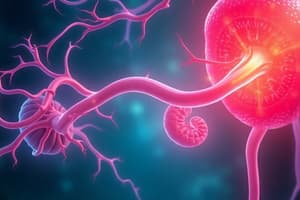Podcast
Questions and Answers
What is streptococcal glomerulonephritis?
What is streptococcal glomerulonephritis?
A type of kidney disease caused by an immune response to infection with certain strains of group A streptococcus bacteria.
What are the primary infections that can lead to streptococcal glomerulonephritis?
What are the primary infections that can lead to streptococcal glomerulonephritis?
- Throat infection
- Skin infection
- Both A and B (correct)
- None of the above
The immune response produces antibodies, specifically immunoglobulin G (IgG) and immunoglobulin ____ (IgM).
The immune response produces antibodies, specifically immunoglobulin G (IgG) and immunoglobulin ____ (IgM).
M
The immune complexes formed during the immune response are solely composed of antibodies.
The immune complexes formed during the immune response are solely composed of antibodies.
Where do the immune complexes deposit during post-streptococcal glomerulonephritis?
Where do the immune complexes deposit during post-streptococcal glomerulonephritis?
What does the complement activation lead to?
What does the complement activation lead to?
What are the two main symptoms of glomerular damage in streptococcal glomerulonephritis?
What are the two main symptoms of glomerular damage in streptococcal glomerulonephritis?
What triggers a sustained immune response leading to further damage in the glomeruli?
What triggers a sustained immune response leading to further damage in the glomeruli?
What factors contribute to the severity and outcome of streptococcal glomerulonephritis?
What factors contribute to the severity and outcome of streptococcal glomerulonephritis?
Flashcards are hidden until you start studying
Study Notes
Definition
- Streptococcal glomerulonephritis (GN) is kidney disease resulting from an immune response to group A streptococcus bacteria.
- It typically follows throat or skin infections, including strep throat or impetigo.
Infection
- Begins with skin or throat infection by group A streptococcus.
- Bacteria possess virulence factors like M protein and surface antigens to evade the immune system.
Immune Response
- The immune system identifies the infection and responds to eliminate it.
- Antibodies produced include immunoglobulin G (IgG) and immunoglobulin M (IgM) targeting streptococcal antigens.
Immune Complex Formation
- Antigen-antibody complexes, or immune complexes, form during the immune response.
- These complexes primarily consist of streptococcal antigens, antibodies (mainly IgG and IgM), and complement proteins.
Deposition in Glomeruli
- Immune complexes enter the bloodstream and may deposit in kidney glomeruli.
- Glomeruli are essential for filtering waste and excess fluid from blood.
Complement Activation and Inflammation
- Deposited immune complexes activate the complement system, a protein cascade in the immune response.
- Complement activation recruits inflammatory cells (e.g., neutrophils) and releases inflammatory mediators.
Glomerular Damage
- Inflammation in glomeruli causes damage to the glomerular basement membrane, impairing filtration.
- Results in conditions such as proteinuria (protein in urine) and hematuria (blood in urine).
Activation of Immune System
- Glomerular injury triggers a prolonged immune response, causing further damage.
- The immune system continues to produce antibodies and immune complexes, maintaining inflammation.
Conclusion
- Streptococcal GN is characterized as an immune-mediated disease driven by immune complex deposition, complement activation, and inflammation.
- The disease's mechanisms are not completely understood, and factors such as host immune response and bacterial virulence play a role in severity and outcomes.
Studying That Suits You
Use AI to generate personalized quizzes and flashcards to suit your learning preferences.



